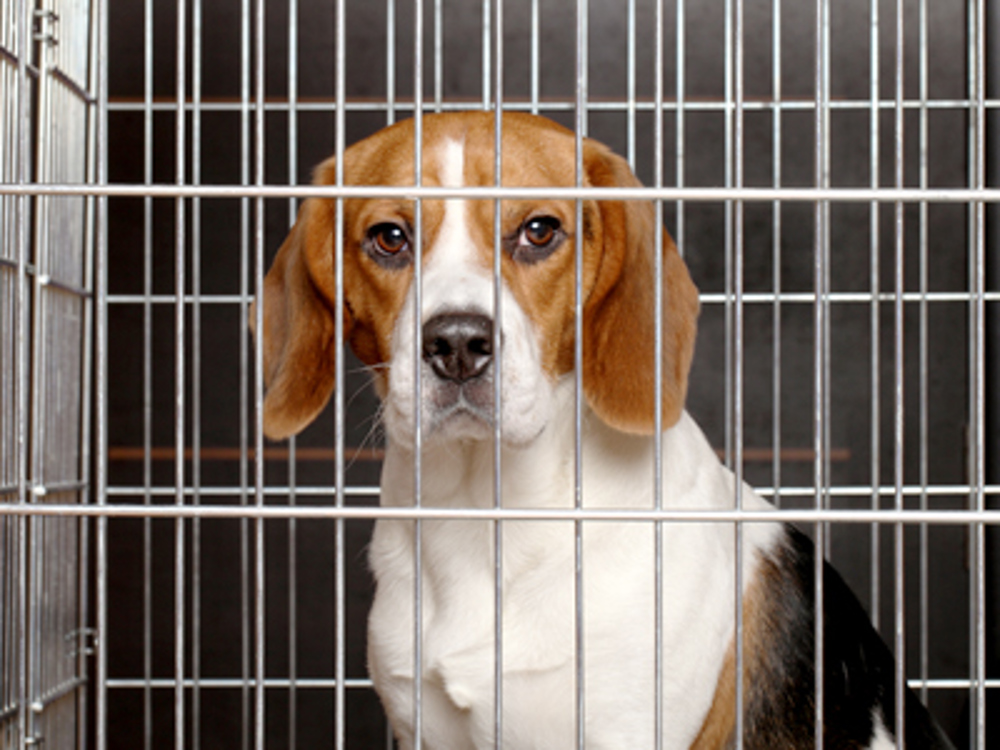
The Kennel Club is opposed to the use of dogs in animal experiments which are conducted for the primary benefit of humans, and has significant concerns over the use of dogs in regulatory toxicity testing.
Statistics
According to the Home Office, over 2.8 million procedures involving living animals were carried out in Great Britain in 2020. Over 2,700 dogs were used in these procedures and a total of 4,340 procedures were conducted on dogs in 2020, with some being used in multiple scientific procedures.
Over 66% of the 4,340 procedures involving dogs in 2019 were carried out for regulatory tests in the development of medicinal products for human use.
Since 2014, over 20,000 dogs have been used in almost 31,000 scientific procedures.
Background
The use of two species in regulatory testing is a legal requirement, with dogs most commonly used as the second species. In 2014, the majority of regulatory tests involving dogs were ‘repeated dose toxicity’ tests, which are used to determine whether continuous exposure to a substance – such as a potential medicinal product – becomes poisonous over a prolonged period.
In such tests, dogs may be injected with or fed drugs and chemicals, and are then observed for signs of adverse effects. These effects can include vomiting, internal bleeding, organ damage, seizures or even death. Unfortunately, these tests commonly last for several months and, afterwards, the dogs used are euthanised so that an autopsy can be carried out.
Legislation
The Animals (Scientific Procedures) Act 1986 regulates the use of animals in experiments and testing across the country. This legislation is implemented by the Home Office in England, Scotland and Wales, and by the Department for Health, Social Security and Public Safety in Northern Ireland.
Fund for the Replacement of Animals in Medical Experiments
The Fund for the Replacement of Animals in Medical Experiments (FRAME) actively funds and promotes alternatives to animal testing. FRAME advocates robust scientific methods and available non-animal techniques and their benefits to the current and future scientific community, whilst investigating and developing new methods at the forefront of science.
We support and financially contribute to the work of FRAME to carry out research on the use of dogs in laboratories, with the aim of developing a scientific strategy to minimise and eventually eliminate the cruel use of dogs in biomedical research and testing.
The Kennel Club's view
We are strongly opposed to the use of dogs in chemical toxicology and drug safety evaluation conducted primarily for the benefit of humans. While we acknowledge that testing may currently be required by national and international legislation, we believe that animal testing should always be kept to an absolute minimum and only used when alternative testing is not possible. It is also essential that the highest standards of animal welfare are adhered to in all animal testing facilities and associated breeding establishments.
Where animals continue to be used in experiments, we strongly support the 3Rs as guiding principles which underpin the human use of animals in scientific research. The 3Rs are:- replacement,
- reduction,
- and refinement.
However, more must be done to ensure that animals are not used in testing unnecessarily and to reduce the use of animals in scientific research altogether. As well as this, improved standards in reporting of animal experiments are required, along with greater transparency of the use of animals in experiments to avoid unnecessary duplication of experiments.
The Kennel Club's recommendations
We believe that the number of live experiments should be reduced and the welfare of laboratory dogs improved. This could be achieved through:
- commissioning an independent review of whether the benefits derived from using dogs in second-specifies toxicity tests justify their use, and whether more suitable alternatives are available
- increasing the transparency of animal testing and removing the so-called privacy clause from animal testing legislation
- requiring establishments, including breeding facilities, to rehome dogs wherever possible and to publish accurate statistics regarding the rehoming of laboratory animals on an annual basis
- collaboration between Government, the scientific sector and funding bodies to improve the reporting of animal testing
- requiring all results from animal experiments – both positive and negative – to be published to avoid unnecessary duplication, with allowances for the protection of genuinely commercially sensitive information
- reviewing the welfare of dogs in laboratories, including breeding, transportation, housing, nutrition, health, handling and euthanasia, to ensure that all efforts to reduce suffering are being implemented and followed
- increasing funding to develop alternatives to animal testing
